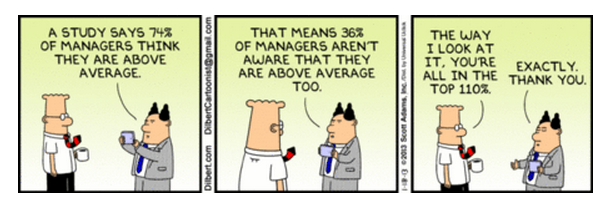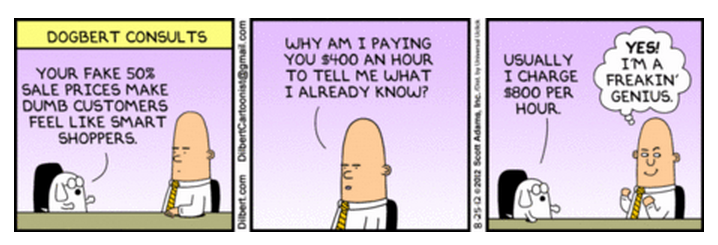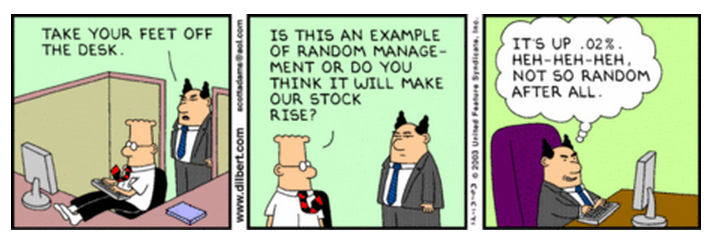Believe it or not, you can learn a lot from fiction. Some might say that’s because fiction often imitates real life. Of course, that doesn’t necessarily help explain why some of the silliest comic strips have lessons embedded in them.
Dilbert, the infamous comic strip written and drawn by Scott Adams, is a humorous look at office life, but it also offers some remarkably useful insight on behavioral economics. As a basic definition, behavioral economics is essentially the study of how social and psychological factors can affect the market and its resources. More often than not, the effects are brought on by a decision made by an individual, institution or business.
In fact, if we look at just Dilbert alone there are four clear lessons we can take away and apply to our business.
- A Lesson in Overconfidence
It doesn’t matter what market you work in, overconfidence can plague you. And it can affect upper-level management as well.
In this strip, Dilbert’s boss shows overconfidence by assuming that all management is – himself included – above average. This is hardly the truth as we’ve all encountered employees and managers who are well below average in terms of skill and knowledge. As for Dilbert’s boss, he completely misses the jab attacking his math skills because he’s too focused on himself.
A recent study conducted by the Universities of Missouri, Georgia Tech and Texas-Arlington have revealed that CEOs who exhibit overconfidence can end up involving their companies in risky ventures that may or may not hurt the business in the long run.
We all need to take some time to cool our egos and look at the world around us more realistically. In terms of behavioral economics, overconfidence or an excessively large ego can cause you to slack in our own work ethic or take uncalculated risks. It doesn’t matter how good your company or business is doing, you should always work to the best of your abilities and make decisions objectively.
- A Lesson in Framing
Framing refers to various scenarios where decisions we make are influenced by presented information. In other words, if the information is presented in an off-kilter manner it could have a negative effect on a decision, as opposed to a positive one. To put it bluntly, framing can alter whether we see the glass as half-full or half empty.
In this strip, Dogbert and his client mock customers chasing after a deal that actually isn’t a deal. They go so far as to call customers “dumb” for purchasing products marked as “50 percent off” because they in fact believe they are getting great value. Yet, the client thinks of himself as intelligent even after it is revealed that he has fallen into the same trap.
If you go into a situation thinking positively, the outcome is more likely to be positive. This strategy can also be used to your advantage to engage with customers. Depending on how you frame your messages, it can also be used to make the best of a bad situation.
- A Lesson in Loss Aversion
Sometimes, a loss can feel more powerful than a gain of the same magnitude and vice versa. Considering the pain of a loss – or euphoria of a gain – can weigh heavily on future decisions it can cause more harm than good.
In this strip, Dilbert converses with a garbage man who clearly understands that sometimes losses are necessary. Interestingly enough, the discussion is about greener pastures in terms of work and many would consider sanitation an undesirable job.
4. A Lesson in Confirmation Bias
Confirmation bias is when you actually seek out evidence to support a predisposed belief.
In this strip, Dilbert’s boss believes that his managerial skills can affect the company stock. His belief is later reinforced, mostly by coincidence. However, because he was affected by bias he mistook the research as confirmation.
From a business perspective, this can affect your decisions and the future of your company. You should spend time and attention on the right elements. It also means you cannot ignore minor issues, because they could snowball into more severe problems. The best way to combat this is to get an outsider’s perspective or a second opinion before taking action – especially if you feel that your decision may be influenced by a personal bias.
Look to Dilbert in the Future
Of course, these lessons aren’t the only ones you can glean after reading Dilbert. Have you discovered lessons in other Dilbert strips? Will this information aid you in the near future?



